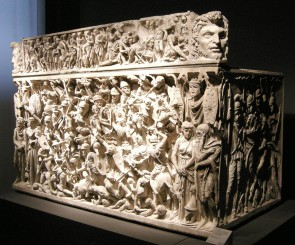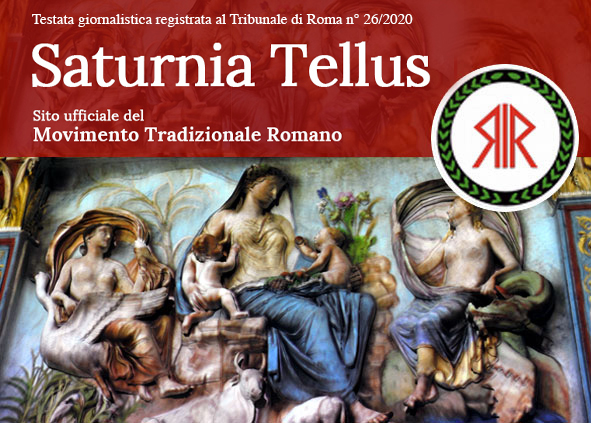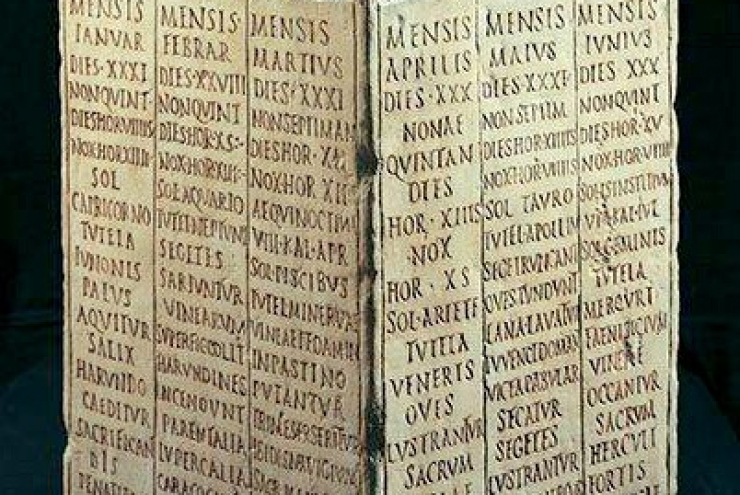
Porphyry’s legacy: the reaction of the polytheistic tradition against globalist Christianity.
“The crap of the gospels should be taught to old ladies and not to reasonable people. Anyone who takes the trouble to examine the facts told by Christians with a little of attention would find thousands of similar stories but without a shred of meaning.” (Porphyry: Against Christians)
In Madrid, on a warm morning in 2012, the zealous teacher of my daughter’s kindergarten concluded the introduction of the school year explaining, as if it were an irrelevant detail, that thanks to the new school regulations the hour of Catholic religion had become optional. To my question about what activities a student would do if he had not followed the lesson, a brief, embarrassed silence followed, and a surprised look: “If some child does not want to follow the religion hour, we will have them draw something in the corridor. However, in the end, it is only an hour of ethics, of Christian ethics, but we know that there is no other ethics outside of Christianity“.
… and I thought of Socrates, Plato, the great philosophers of the past who had coined the term “ethics”, and I thought of the giants of Roman history, men, and women who embodied the virtues. I also thought about the enormous slice of humanity that had not known Christianity for temporal or geographical issues: Buddha, Confucius and billions of people. All labeled as “without ethics”. From her in whose hands I placed my daughter’s education.
Without blaming too much the teacher and looking at things from the top of history, we realize that this is the result of centuries of a continuous brainwashing, which at times in the ages seemed to give up but then returned in waves with renewed vigor, transforming in appearance but remaining in substance the same. Christianity in history has clung to power and destroyed first the sacred images of the Gods and the texts of the ancient religions, then eliminated the polytheists from the cities, destroying the temples, with whose stones it built its churches. Then Christianity called the survivors, who were practicing the ancient religion in the countryside, “pagans”, which means peasants. Finally, Church stole our memory, transforming our benevolent deities into devils and demons, the omnipotent Gods and protectors into false and liars, and subtly justifying the possibility of a pagan era prior to Christianity as a primitive season of spiritual preparation for monotheism.
And we are children of this lie, victims of this perpetual brainwashing, from the cradle onwards. I myself, many years ago, attended the classical high school, without understanding the true soul that fed that eternal flame that was still talking through a thick glass of cultural incomprehension. Monotheism was the only voice to be taken seriously for the affairs of the soul. A voice that I kept listening to for many, too many years. I too was hunting for witches.
However, sometimes chance, fate, the Gods, philosophy or, according to some Catholics, the misfortune of not having spoken with the friar on duty makes us go back to our roots, to our pride to be wolves and not stupid lambs, afraid in the night, waiting for an elusive shepherd. We rediscover the traditional values of our Land when we go through the polemic between national and traditional polytheism against an internationalist and globalist monotheism, disrespectful of the ancient customs and ready to accuse the Western culture of all the faults of the planet. Diabolically, it is appropriate to say, many of these faults have to do with ethnic and cultural cleansing occurred precisely because of Christianity, such as the forced conversions of entire peoples in the Americas.
In reality, the heated confrontation between Christian monotheism and polytheism began two thousand years ago. Not with Judaism, which celebrates its traditions under its own ethnic god, but with Christianity that wants to impose itself as a Catholic (καθολικός = universal) and take spiritually the place of traditional polytheism and politically take possession of the empire. Porfirio, a disciple of Plotinus, besides being a fine Neoplatonic philosopher, was a champion of polytheism against Christianity, of which he knew very well the scriptures, namely the Old and New Testaments. He composed many excellent works, including a work in 15 books “Against the Christians”, obviously burned by the recipients, not very accustomed to criticism. However, even if now the ashes of the work have been dispersed in the four cardinal points of the world, the Jesuit zeal with which the so-called church fathers were careful to counteract the whole work, point by point, allows us to rebuild much of the original arguments and resume the diatribe from where it was left.
Why is Porfirio arguing against Christians? In his day Christianity was rapidly gaining power and strength. The Christians defined their religion as the only true and disqualified each other, introducing a factor of religious intolerance that characterized our history from Constantine onwards. As if this were not enough, some Neoplatonic philosophers had converted to Christianity and were forcing philosophy for their own purposes, regardless of the logical blunders that they were selling as revealed truth. If polytheism had harmonically accepted that Jupiter could be the Demiurge of the Cosmos, Christians placed their God directly as the Being. A Being who intervened in history, who walked in the Garden of Eden with men, but who then punished his own creation, a God who sided capriciously in the battlefields, which raged if all the enemies of Israel were not exterminated, women and children included[i]. A God who represented the opposite of an uncontaminated idea of Good and transcendence. His progeny, moreover, in the figure of Jesus, was identified with the Logos himself, with the claim to have a human being cover the role that Sofia had in the philosophical saving process.
It would be worth reviewing all of Porphyry’s arguments against Christian superstition, specific topics addressed to defined sections of the Christian canon, ranging from metaphysical reflections to concrete examples of the inadequacy of Peter and Paul to cover any sensible religious or philosophical role. It would be worthwhile, because I am sure that the opportunities to remember these topics would not be lacking, considering all the zealous teachers, bigoted friends, the popes or the good-willed friars who want to bless the house, invading your private sphere.
Let us go to the point of the controversy with some examples. In Genesis 2.17 God says: “but of the tree of the knowledge of good and evil you shall not eat, for in the day that you eat of it you shall surely die”. One of the cornerstones of Neoplatonic thought is the identification of the One, the hierarchical top of everything, with Plato’s Good. The knowledge, understood as Sophia, helps to discern and recognize the true good in a continuous tension towards the One, while the lack of knowledge, or ignorance, is the cause of ethical evil (we remember the cave of Plato). In fact, the ethical evil is the behavior that goes in the direction opposite to good, towards the multiplicity and the chaos of becoming (metaphysical evil). If in part one could understand that a God forbids the knowledge of evil, how can one affirm that He forbids the knowledge of Good to human beings? A humanity immersed in total ignorance of good and evil could not make any correct ethical choice and would be condemned to drift by the One. It should be noted that this subject was similarly proposed also by Celso and by emperor Giuliano. A God who forbids the knowledge of Good is evil. How could it be that the fathers of the church, with their Neoplatonic background, did not realize this contradiction? Generally, the Christian world overcomes these difficulties by the crutch of faith or, in other words, by killing philosophical argumentation.
From the first letter to the Corinthians, 7.31 we read: “and those who deal with the world as though they had no dealings with it. For the present form of this world is passing away”. What does Paul mean by stating that the form of this world must pass? Precisely, what should you go through and why? If the Creator is the cause of this “passing”, then he would be guilty of causing the change to something solidly established. And if he wanted to make an improvement in the world, then he would still be guilty of the ignorance of having generated in his creation an imperfect world destined to disappear. In short, it would be like admitting that the creator made a mess. And if we need to wait for the end of time to have a perfect world, we must object that the creator himself is the source of all suffering and misery of this world. The Creator would have violated the rational principle of nature by creating a fiasco of creation. Such a philosophical mess cannot be accepted by anyone who seriously wants to do philosophy and theology.
Another great point of disagreement takes place on ethics. For centuries Christians have been explaining that heathens not only did not have any spirituality but also that they were without ethics. Because of this brainwashing, even today a bigoted teacher feels comfortable by expressing thoughts worthy of Torquemada. In reality, traditional polytheists have been accusing Christians of impiety and atheism with valid arguments. In the Neoplatonic world, the way to the Good is characterized by a constant daily exercise of virtues, of piety, of meditative contemplation. Porphyry, besides, promoted abstinence from meat to keep body and soul uncontaminated by animals. He also presented Pythagoras as an example to follow for those wishing to take the long path to Good. Only a few indefatigable saints can reach the contemplative vision of the One, after a hard daily exercise and a long religious, virtuous and theurgic practice. Christians, on the other hand, do not need to imitate a model like Pythagoras, as they have a shortcut. In fact, the first letter to the Corinthians recites (1 Corinthians 6:9-11): “neither the sexually immoral, nor idolaters, nor adulterers, nor men who practice homosexuality, nor thieves, nor the greedy, nor drunkards, nor revilers, nor swindlers will inherit the kingdom of God. And such were some of you. But you were washed, you were sanctified, you were justified in the name of the Lord Jesus Christ and by the Spirit of our God.” When Paul says “such”, he speaks about human dregs, to sinners par excellence, bandits, bandits, ignoramuses, exploiters, thieves, murderers, perverse, and so on. They, who have never meditated, who do not respect the laws nor exercise the virtues, when they submit to the so-called baptism, they suddenly become pure and free from sin. Porphyry rightly wonders who would not prefer a life of corruption simply on this promise, who would not devote himself to the most wicked vices, sure to get away with at the very last moment, thanks to the forgiveness of the judge of the dead and the living. This kind of promise encourages those who live in sin and ignorance. This type of doctrine produces an attitude of rebellion towards good customs and virtues. We conclude with the words of Porphyry: “Christians would lead us to a lawless society, they would teach us not to fear the Gods. This arrogant teaching of their scriptures speaks volumes, as it states that all guilt and vice can be washed away simply by baptism “.
This is the real argument that even today is troubling us, polytheists. We seek the divine in all the verticality of the cosmos, looking into the depths of a well of water, observing the planets and the smoke of incense on the altar, admiring the rays of the sun at dawn as Janus, reasoning on the immortality of the soul, on the celestial Gods and on the Unspeakable One, the ineffable Silence of the Silences. We approach the path of virtue, aware that it is long and impervious. We look for the Beauty in the statues of the deities, we admit Eros and Amor as a force of the Universe and we remain ecstatic whenever the world manages to bring out, even for a moment, the reflection of a perfect form, a spark of Nous. They tried to reduce this spirituality to ashes. But the fact that we are still talking about it shows that they did not make it because, as Plato teaches us, Ideas are immortal. Thank you, Porphyry, we collect your legacy. The Roman tradition rises renewed, also thanks to you.
[i] 1 Samuel, 15:2-3 This is what the Lord Almighty says: ‘I will punish the Amalekites for what they did to Israel when they waylaid them as they came up from Egypt. 3 Now go, attack the Amalekites and totally destroy[a] all that belongs to them. Do not spare them; put to death men and women, children and infants, cattle and sheep, camels and donkeys.’
Mario Basile
Scritto a Forum Hadriani, a.d.V Id Nov MMDCCLXX
















